 Petzlover
Petzlover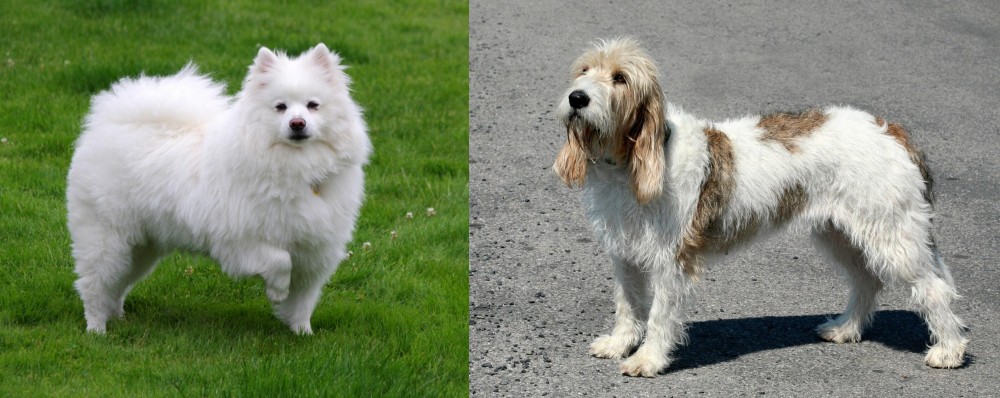 American Eskimo Dog is originated from United States but Grand Basset Griffon Vendeen is originated from France. Both American Eskimo Dog and Grand Basset Griffon Vendeen are having almost same height. Both American Eskimo Dog and Grand Basset Griffon Vendeen are having almost same weight. Both American Eskimo Dog and Grand Basset Griffon Vendeen has almost same life span. American Eskimo Dog may have less litter size than Grand Basset Griffon Vendeen. American Eskimo Dog requires High Maintenance. But Grand Basset Griffon Vendeen requires Moderate Maintenance
American Eskimo Dog is originated from United States but Grand Basset Griffon Vendeen is originated from France. Both American Eskimo Dog and Grand Basset Griffon Vendeen are having almost same height. Both American Eskimo Dog and Grand Basset Griffon Vendeen are having almost same weight. Both American Eskimo Dog and Grand Basset Griffon Vendeen has almost same life span. American Eskimo Dog may have less litter size than Grand Basset Griffon Vendeen. American Eskimo Dog requires High Maintenance. But Grand Basset Griffon Vendeen requires Moderate Maintenance
 The American Eskimo is derived from the Nordic Spitz breed and most closely related to the German Spitz in particular. There were many German Spitzes in the United States at the time of the second World War and anti-German sentiment caused its name to change to the American Eskimo Dog. However, as the breed developed over time in the States, the American Eskimo became its own separate breed. In addition to the German Spitz, the American Eskimo is also related to the white Keeshond, the Samoyed, the white Italian Spitz and the white Pomeranian.
The history is beginning to show that the Spitzes that were brought to the US in the early 1900’s was white. This color was not popular in Europe but was quickly the favorite in the United States. They were originally working dogs on farms and ranches. They have excellent herding instincts, make goo watch and guard dogs, and good law enforcement sniff dogs. However, their first introduction to the American public was through the Cooper Brothers’ Railroad Circus and Stout’s Pal Pierre at the Barnum and Baily Circus. Eskimo puppies were sold after the circus show.
The American Eskimo is derived from the Nordic Spitz breed and most closely related to the German Spitz in particular. There were many German Spitzes in the United States at the time of the second World War and anti-German sentiment caused its name to change to the American Eskimo Dog. However, as the breed developed over time in the States, the American Eskimo became its own separate breed. In addition to the German Spitz, the American Eskimo is also related to the white Keeshond, the Samoyed, the white Italian Spitz and the white Pomeranian.
The history is beginning to show that the Spitzes that were brought to the US in the early 1900’s was white. This color was not popular in Europe but was quickly the favorite in the United States. They were originally working dogs on farms and ranches. They have excellent herding instincts, make goo watch and guard dogs, and good law enforcement sniff dogs. However, their first introduction to the American public was through the Cooper Brothers’ Railroad Circus and Stout’s Pal Pierre at the Barnum and Baily Circus. Eskimo puppies were sold after the circus show.
It was then that the breed became one of America’s favorite breeds and they quickly became house pets. Following World War II, Japan exported the Japanese Spitz into America and it was crossed with the Eskimo also. The American Eskimo Dog breed was not recognized by AKC until 1985. Still in 1958 there was no official breed club in the States but there were growing numbers of the dogs. It was not until 1970 did the National American Eskimo Dog Association (NAEDA) come into being. They collected the pedigrees of the first 1750 dogs to be AKC registered.
Since the American Eskimo Dog is not recognized internationally, those wishing to participate in international competition such as England’s prestigious Cruft’s Dog Show must register their dogs a German Spitz. Despite this the American Eskimo and German Spitz remain two very different breeds.
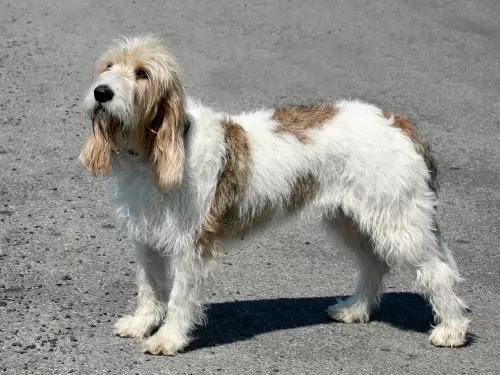 The Grand Basset Griffon Vendeen is a French scenthound that has changed over many centuries and today the area in France where they originate from, has contributed to the dog's looks.
The Grand Basset Griffon Vendeen is a French scenthound that has changed over many centuries and today the area in France where they originate from, has contributed to the dog's looks.
The rocky and thorny region of Vendeé required a hardy breed of dog. Also, hunters wanted a slower hound that they could keep up with, and the idea was to shorten the legs of the dog.
By the end of the 19th century, the Basset Griffon Vendéen was developed. By the 1950s, the Grand was considered a separate breed. and Petit was not banned until 1977.Today the dog is a long-backed and short-legged hunting dog.
 This small to medium dog is beautiful and resembles a miniature Samoyed. There are three sizes of American Eskimo – the standard, miniature, and the toy. The Eskimo’s head is wedge shaped with tall, triangular, erect ears. It has a heavily plumed tail with a sharp curl over the back. The Eskimo can burst into bold action due to their good legs and feet.
This small to medium dog is beautiful and resembles a miniature Samoyed. There are three sizes of American Eskimo – the standard, miniature, and the toy. The Eskimo’s head is wedge shaped with tall, triangular, erect ears. It has a heavily plumed tail with a sharp curl over the back. The Eskimo can burst into bold action due to their good legs and feet.
The coat is a double one with a harsh outer coat and plush inner one. The coat is always white or white with cream or biscuit markings, and visible skin in gray or pink. The American Eskimo’s ruff or mane is very heavy, and the nose, eyelids, pads and gums are black. They have dark eyes and blue are not allowed.
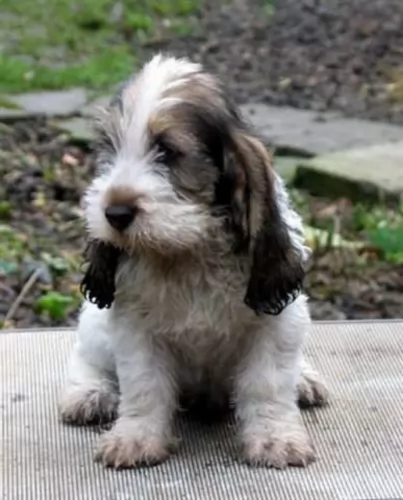 Kept today essentially as a domestic pet, the Grand Basset Griffon Vendéen is a strongly built dog, a rough-coated scent hound of medium size standing at roughly 39 to 45cm in height and weighing 18 to 20kg.
Kept today essentially as a domestic pet, the Grand Basset Griffon Vendéen is a strongly built dog, a rough-coated scent hound of medium size standing at roughly 39 to 45cm in height and weighing 18 to 20kg.
The coat is medium length, shaggy and wiry. It is essentially white with orange markings. Sometimes he can be tri-colored, having a combination orange, black or tan markings. The Grand Basset Griffon Vendeen’s coat is double with a thick, weather-resistant undercoat and a rough, harsh topcoat. In addition to regular brushing, this breed’s coat needs to be hand-stripped once a year.
His legs are straight, and he is longer than he is tall. He is a deep chested dog with long ears and a long tail. He is also noted for his mustache and beard with long eyebrows.
Your Grand Basset is a courageous, happy, confident dog, active and having great stamina.
He is a social, pack dog so he will be wanting plenty of time spent with his owner, failing which the owner should invest in another dog too. He will get on great with children and he is also a pet-friendly breed who will get on well with cats too. He is sharp and alert and responds well to training and socialization.
 The Eskimo is affectionate, playful and love children of all ages. They are intelligent and want to please you. They can be trained easily and are champions of the obedience trial. They are fun and confident. At the same time, they need a confident pack leader. He is prone to Little Dog Syndrome where the dog thinks they oversee the home and display all sorts of behaviors. Under these circumstances the American Eskimo can become obsessive, aggressive, and engaging in obsessive resource guarding and barking.
The Eskimo is affectionate, playful and love children of all ages. They are intelligent and want to please you. They can be trained easily and are champions of the obedience trial. They are fun and confident. At the same time, they need a confident pack leader. He is prone to Little Dog Syndrome where the dog thinks they oversee the home and display all sorts of behaviors. Under these circumstances the American Eskimo can become obsessive, aggressive, and engaging in obsessive resource guarding and barking.
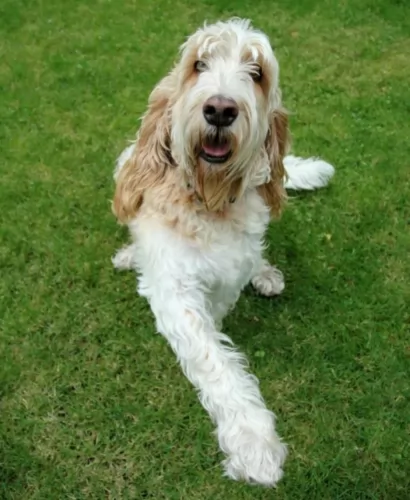 This long-backed, short legged hunting dog has a happy, confident personality.
This long-backed, short legged hunting dog has a happy, confident personality.
While he was used originally for hunting, he is now commonly kept as a companion dog. He is energetic and independent and will require you having him join you for walks and a ball game too.
Non-aggressive and adaptable he can live in the city or in the countryside so long as he receives plenty of attention and love – then he'll be a splendid pet.
 The American Eskimo Dog is prone to hip dysplasia. Their eyes and tear ducts are potential issues with progressive retinal atrophy. They are allergic to fleas and have a tendency to be overweight.
The American Eskimo Dog is prone to hip dysplasia. Their eyes and tear ducts are potential issues with progressive retinal atrophy. They are allergic to fleas and have a tendency to be overweight.
We deal with PRA (Progressive Retinal Atrophy) in greater detain in a following section but it is not as destructive as it used to be. It is much more treatable now.
There are potentially some dental issues that some American Eskimo Dogs are prone to.
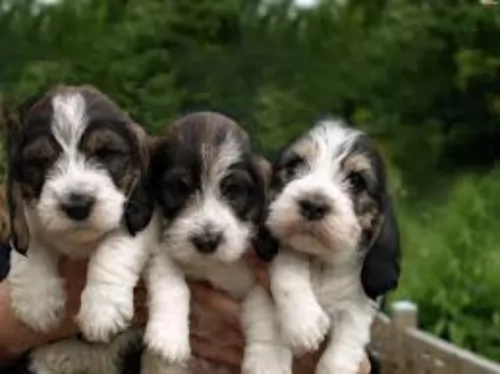 There are some Basset Griffon Vendéens that have reached 17 years of age. This is excellent for these dogs and lifestyle, nutrition and exercise can all play a part in the longevity of any dog.
There are some Basset Griffon Vendéens that have reached 17 years of age. This is excellent for these dogs and lifestyle, nutrition and exercise can all play a part in the longevity of any dog.
Generally they live to be 10 to 14 years of age. While he is a pretty robust dog, you'll want to be aware of some of the diseases which may require veterinary intervention -
Cancer is a major cause of death in elderly dogs, but if caught early, the dog can be cured. These cancers can be malignant lymphoma, skin cancer, bone cancer or soft tissue sarcomas. You'll notice a lump on your pet or a wound they won't heal. When you notice your dog not feeling well, get him to the vet.
A common form of heart disease in dogs is valvular disease, heartworm disease and myocardial disease. The signs of heart disease in your pet will depend on the severity of the disease and type. As heart disease moves on to congestive heart failure, you'll notice symptoms such as difficulty with breathing, fatigue, loss of appetite and weight loss. You need to get your dog immediately to the vet.
Dog allergies can be caused by pollen, medications, food or insects. You'll notice your pet scratching, he'll have watery eyes and inflamed skin. This inflammatory condition can cause a lot of agony for your pet, driving him mad with pain and the desire to scratch and lick. Relieve his discomfort by getting him to the vet as soon as possible.
 Your American Eskimo Dog needs a high quality food so they will not get overweight. Make sure you know how much is appropriate for your particular dog and her specific age. The puppies should be fed twice a day but adults only once.
Your American Eskimo Dog needs a high quality food so they will not get overweight. Make sure you know how much is appropriate for your particular dog and her specific age. The puppies should be fed twice a day but adults only once.
As previously mentioned the American Eskimo Dog is prone to eye issue such as Progressive Retinal Atrophy or (PRA) – this disease is inherited and used to cause blindness as the rods in the retina died. New medical discoveries mean this is no longer a hopeless disease. Their eyes are also susceptible to other issues so make sure you check them and the tear ducts regularly.
Like so many other breeds the American Eskimo is also susceptible to hip dysplasia and a moving patella in the knee. For this reason watch their weight. They can also be very allergic.
This small dog has more energy than his size can handle. He needs a lot of exercise and a place to run. If he will become hyperactive and destructive. They are prone to disturbing behaviors such as spinning (spinning in circles) when they don’t get enough exercise. The American Eskimo Dog is smart and agile, Play games like catch or agility. They are also great at herding, competitive obedience or detection.
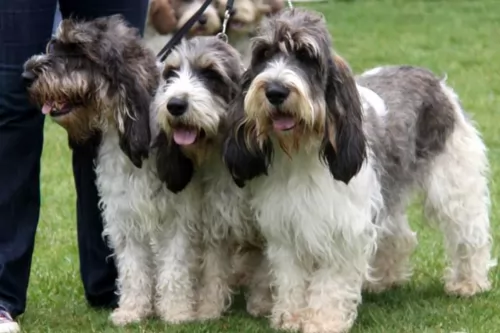 If you are going to be feeding your Grand Basset Griffon Vendéen kibble, there are excellent brands that bring out breed-specific formulas for age, size and energy levels of dogs.
If you are going to be feeding your Grand Basset Griffon Vendéen kibble, there are excellent brands that bring out breed-specific formulas for age, size and energy levels of dogs.
Feeding a dog is an individual choice, but good food can increase his longevity. A bit of raw meat mixed into his kibble, or some cooked brown rice, vegetables and chicken will be excellent for him. This can be a tasty variety to his diet.
Fresh, cool water must always be available at all times.
The Grand Basset Griffon Vendeen’s coat is double and the rough, harsh coat will need brushing twice a week and stripped once a year.